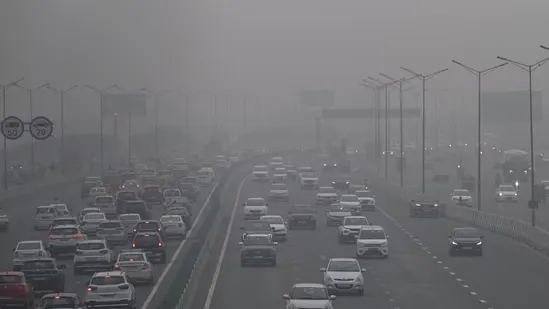Trending
Severe+ air quality triggers GRAP Stage-IV in Delhi-NCR: Restrictions, measures and impact on daily life
.png)
3 min read | Updated on November 18, 2024, 10:51 IST
SUMMARY
Delhi-NCR has implemented Stage-IV measures under the Graded Response Action Plan (GRAP) as the Air Quality Index (AQI) breaches the "Severe+" category.

A thick layer of smog blankets Delhi-NCR as authorities implement Stage-IV of the Graded Response Action Plan (GRAP) to combat hazardous air quality.
The Stage-IV measures under the Graded Response Action Plan (GRAP) came into effect across Delhi-NCR from 8 am on Monday amid rapidly deteriorating air quality in the region. The Commission for Air Quality Management (CAQM) on Sunday directed the implementation of stage-IV measures under GRAP after the Air Quality Index (AQI) in Delhi breached the "Severe+" threshold.
The CAQM directed various agencies, including the Delhi Pollution Control Committee and respective pollution control boards of NCR, to ensure strict implementation of actions under Stage IV.
Here’s what it means, why it’s happening, and what measures are being taken.
What is GRAP?
The Graded Response Action Plan (GRAP) is a set of emergency measures implemented in the National Capital Region (NCR) based on the severity of air pollution. It has four stages, ranging from Stage-I ("Poor" air quality) to Stage-IV ("Severe+"). Each stage comes with specific actions to reduce emissions and protect public health.
Stage-IV, the strictest level, is implemented when the Air Quality Index (AQI) exceeds 450, which signifies "Severe+" conditions. This level of pollution poses serious health risks to everyone, especially vulnerable groups like children, the elderly, and those with chronic illnesses.
Why has Stage-IV been invoked?
The sub-committee of CAQM convened an urgent meeting on November 17 to assess the region's air quality and meteorological forecasts. Forecasts from the India Meteorological Department (IMD) and Indian Institute of Tropical Meteorology (IITM) predict the AQI will remain in the higher end of the "Severe" or "Severe+" categories due to adverse weather conditions, including heavy fog and variable winds.
What are Stage-IV measures?
Under Stage-IV, authorities have rolled out stringent restrictions to limit emissions and reduce exposure to polluted air. Key measures include:
The sub-committee has also urged vulnerable groups, including children, the elderly, and those with chronic illnesses, to stay indoors.
Stage-III measures already in effect
As part of Stage-III, the following construction and demolition activities were already banned across NCR to mitigate dust pollution:
Earthwork for excavation and filling, including boring and drilling. Piling, demolition, and trenching for sewer, water, and drainage lines.
Brick masonry, major welding, and RMC batching operations.
Activities like painting, polishing, grinding, and fixing tiles, except minor indoor repairs.
Water-proofing (excluding chemical water-proofing).
Road construction and repairs, transfer of dust-generating materials like cement or fly ash, and demolition waste transportation.
Movement of vehicles carrying construction materials on unpaved roads.
By signing up you agree to Upstox’s Terms & Conditions
About The Author
Next Story

